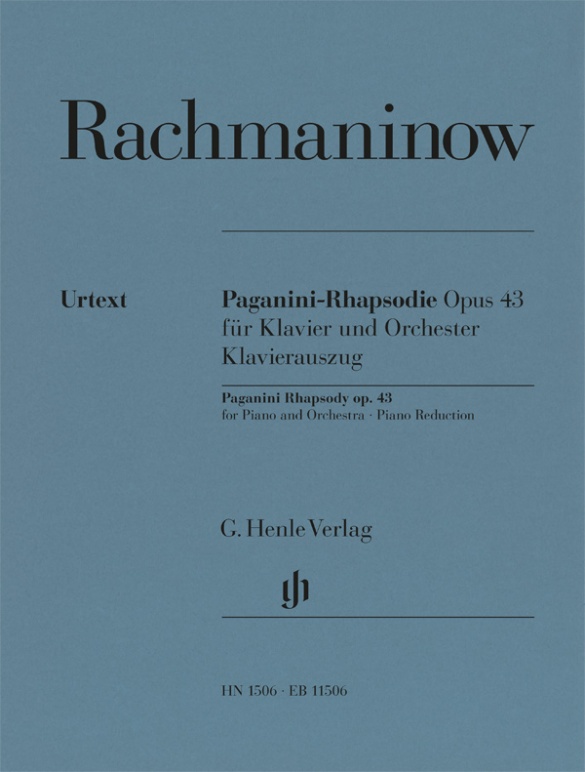

Sergei Rachmaninoff
Rapsodie sur un thème de Paganini op. 43
Sergei Rachmaninoff’s Rhapsody on a theme of Paganini was his last and at the same time most significant work for piano and orchestra. As a cycle of variations on Paganini’s 24th Caprice from op. 1, it stands in the tradition of the great works on this famous theme by Franz Liszt and Johannes Brahms. “It’s something for the audiences”, wrote the reviewer of the New Yorker about one of the first performances of this Rhapsody with the composer at the piano, “the succession of brilliances for the piano, dramatic references to the Dies Irae, wide-open Schmalz for divided strings, and old-fashioned bravura”. Alongside the Second and Third Piano Concertos, this brilliant work today numbers among Rachmaninoff’s most frequently performed compositions. For this first Urtext edition of the Rhapsody, the editor was able to consult both the autograph held by the Library of Congress and the first edition, the publication of which was supervised by the composer. In addition to the solo part, the piano reduction offers a very playable arrangement of the orchestral setting. Parallel with the present edition, the score and orchestral parts have been published in cooperation with Breitkopf & Härtel.
mws-henle.cms.title-works.headline
mws-henle.cms-product-detail.composer-headline
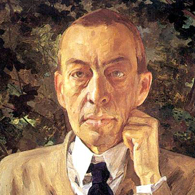
Sergej Rachmaninow
Composer and pianist who continued and expanded the late-Romantic tradition; he prepared the way for Prokofiev and Shostakovich. His oeuvre comprises orchestral works, piano pieces, choral works, several operas, and numerous songs.
| 1873 | Born in Semyonovo on April 1. From 1880 receives professional instruction in music. |
| 1885–92 | Studies music at the Moscow Conservatory. |
| 1890–92 | Piano Concerto No. 1 in F-sharp minor, Op. 1, with the diminished fourth in the main theme typical of his style. |
| 1892 | Successful performance of his one-act opera “Aleko” (a graduation work). Prelude in C-sharp minor for piano. |
| 1897 | Unsuccessful premiere of the Symphony No. 1, Op. 13 (with abrupt contrasts). First experiences as an opera conductor at Moscow’s Mamontov Theater. He becomes acquainted with Fyodor Shalyapin, later his friend. |
| 1900/01 | Composition of the Piano Concerto No. 2 in C minor, Op. 18, in a modified style (broad melodic arcs, transparent compositional style). |
| 1904–06 | Appointed conductor at the Bolshoi Theater in Moscow. |
| 1906 | Premieres of the operas “The Miserly Knight,” Op. 24, and “Francesca da Rimini,” Op. 25. |
| 1907 | Symphony No. 2 in E minor, Op. 27, with whimsical figuration in the woodwinds; Piano Sonata No. 1 in D minor, Op. 28. |
| 1909 | Piano Concerto No. 3 in D minor, Op. 30; symphonic poem “The Isle of the Dead,” Op. 29 |
| from 1910 | More complex compositional technique (enhanced polyphony, ambiguous harmonies, fast rhythmic alterations) in Thirteen Preludes for piano, Op. 32; “Études-tableaux,” Op. 33 (1911); Fourteen Songs, Op. 34 (1910–16). |
| 1917 | Rachmaninoff leaves Russia and lives in Stockholm, Copenhagen, the United States (career as pianist), and Switzerland. |
| 1926/41 | Piano Concerto No. 4 in G minor, Op. 40. In 1935/36, Symphony No. 3 in A minor, Op. 44. |
| from 1939 | He emigrates permanently to the United States. |
| 1943 | Death in Beverly Hills on March 28. |
mws-henle.cms-product-detail.author-headline

Norbert Gertsch (mws-henle.person.role.HERAUSGEBE)
Dr. Norbert Gertsch, born in 1967 in Rheinkamp/Moers, studied piano solo at the Mozarteum in Salzburg and read musicology and philosophy at the Paris Lodron University in Salzburg and the Ruperto Carola University Heidelberg on a scholarship from the “Studienstiftung des Deutschen Volkes”. In 1996 he wrote his doctoral thesis on Ludwig van Beethoven’s Missa solemnis (as part of the New Complete Edition) under Ludwig Finscher.
In the following year, he began to work at G. Henle Publishers, initially as an editor for electronic publishing. After working on a two-year project (1999–2000) sponsored by the German Research Foundation (DFG) preparing a new Beethoven Catalogue of Works, he became a scholarly editor at G. Henle Publishers. In 2003 he became Editor-in-Chief, in 2009 Deputy Managing Director and Head of Publishing. As of 1 January 2024, the Executive Board of the Günter Henle Foundation has appointed Dr. Norbert Gertsch, as the new managing director, succeeding Dr. Wolf-Dieter Seiffert.
Gertsch has published many Urtext editions for G. Henle Publishers, including volumes for a new edition of Beethoven’s Piano Sonatas together with Murray Perahia.
.jpg)
Marc-André Hamelin (mws-henle.person.role.FINGERSATZ)
Product Safety Informations (GPSR)

G. Henle Verlag
Here you can find the information about the manufacturer of the product.G. Henle Verlag e.K.
Forstenrieder Allee 122
81476 München
Germany
info@henle.de
www.henle.com
推荐
autogenerated_cross_selling
本书目其他版本


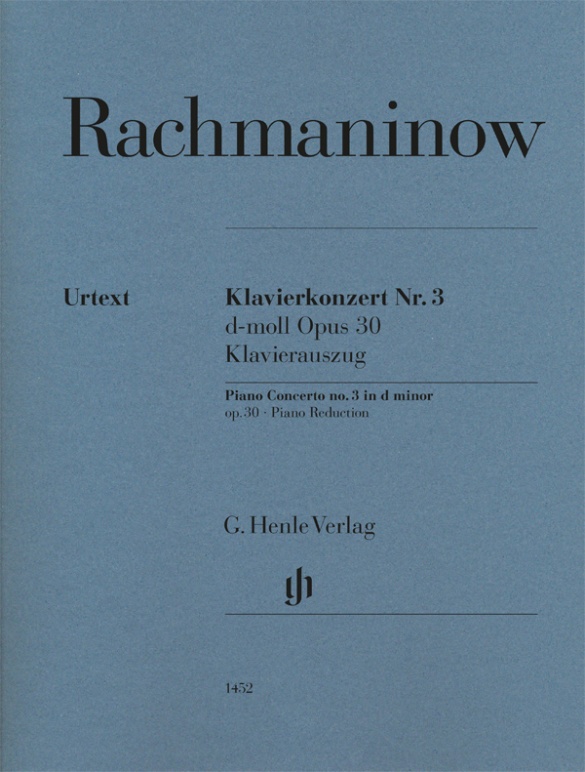
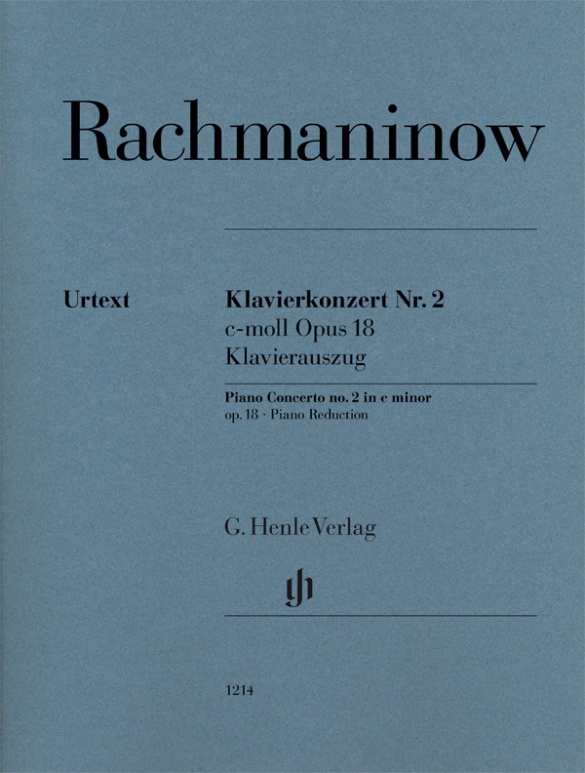

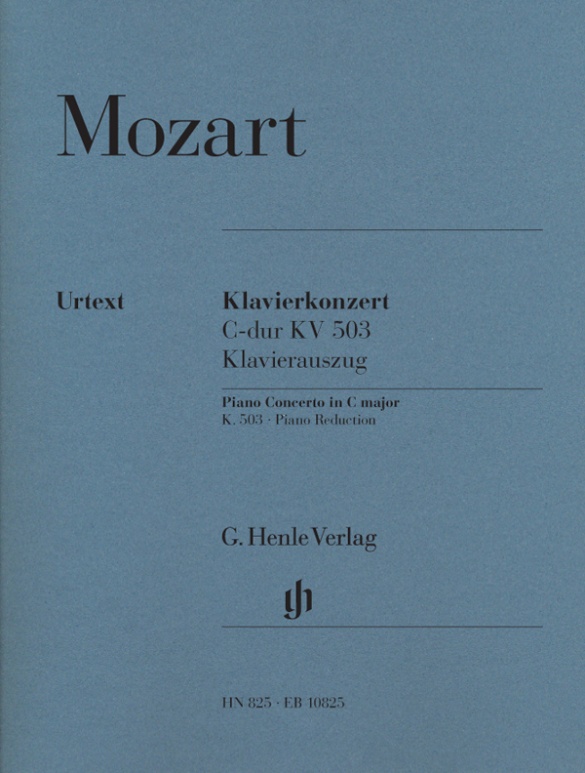
Orchestral material from Breitkopf & Härtel